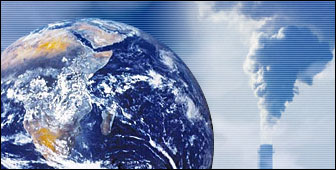Environmental pressures outpace solutions

Growing pressure on natural resources is outweighing the benefits of ecologically efficient production in Switzerland.
That’s the finding of the latest state of the environment report, published on Monday by the Swiss Environment Agency and the Federal Statistics Office.
The two-volume, 670-page report say air pollution has decreased and lakes and rivers have become cleaner – thanks largely to the efforts of industry.
However, every day in Switzerland an area the size of ten football pitches is swallowed up by development, while more cars and aeroplanes now account for one third of all carbon dioxide emissions.
Room for improvement
The term eco-efficiency is based on the concept of creating more goods and services while using fewer resources and creating less waste and pollution.
“The good news is that over the past few years the eco-efficiency of both industrial production and agriculture has increased,” Adelheid Bürgi-Schmelz, director of the statistics office, told swissinfo.
“Unfortunately, we still have room for improvement. We are losing one square metre per second for the building of new houses. Energy consumption is still increasing slightly and we also have a steady increase of traffic, most of it due to leisure activities.”
The problem with the statistics, she added, is that they do not reveal the full picture. Switzerland imports a large amount of industrial products, and the energy consumption required to make them is not included in this report.
International comparison
Switzerland spends about 1.6 per cent of its gross domestic product on environmental protection measures – a figure comparable with other OECD countries.
“On the technical level, we have made good progress in many areas like air pollution,” Philippe Roch, director of the environment agency, told swissinfo.
“In the area of waste management, we have a very high level of recycling in Switzerland, between 60 and 90 per cent depending on the different categories of waste.”
Roch said Switzerland’s main problem was the high population and infrastructure density, which in turn creates pressure on nature and the landscape.
“It is very hard to combat these factors,” he said. “Transport is growing as it is everywhere in the world. It is very difficult to have an influence on it even if our government takes a very strong line on the better use of public transport.”
Roch said many measures had been taken but they were not sufficient. “We need time to convince people to develop measures and we have to have cooperation with the economic sector. There is still a lot to do.”
New risks
The 2002 report also looks ahead to future developments. Although technological advances will further improve eco-efficiency, they also pose new environmental risks.
Roch said more research was needed on the effects of electromagnetic fields and the impact of biotechnology and genetically modified organisms.
Above all, he said, people’s attitude to nature had to change. “We have to have a rediscovery of nature so that people are more respectful of the environment and to each other. We need this solidarity if we want to survive.”
by Vincent Landon

In compliance with the JTI standards
More: SWI swissinfo.ch certified by the Journalism Trust Initiative
You can find an overview of ongoing debates with our journalists here . Please join us!
If you want to start a conversation about a topic raised in this article or want to report factual errors, email us at english@swissinfo.ch.